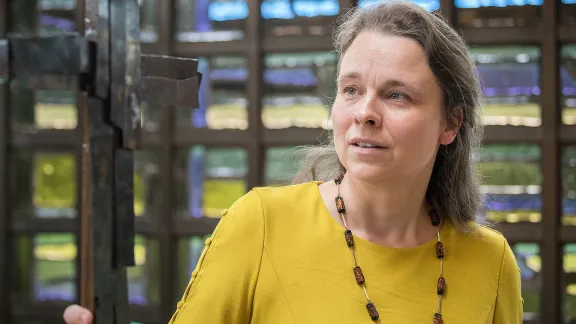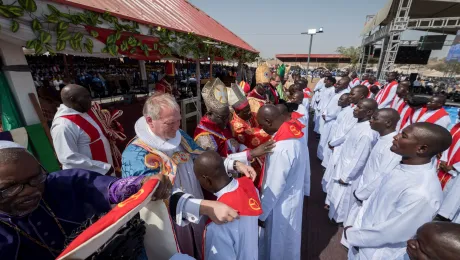
LWF Council member Bettina Westfeld shows a shrapnel cross, moulded from the pieces of shrapnel from bombs dropped over Dresden and Coventry during the Second World War. Photo: LWF/Albin Hillert
Interview with LWF Council member Bettina Westfeld
(LWI) – As a child, Bettina Westfeld (Evangelical Lutheran Church of Saxony) lived in the German Democratic Republic (GDR), often called East Germany after the country was divided in 1945. She still lives in Dresden, the capital of Saxony today. In an interview with Lutheran World Information Westfeld talks about her life in a communist state, the value of cross-border relations and the opportunities inherent in the new beginning.
1989 is a key year in German history. It saw the fall of the Berlin Wall, and 2019 now marks the 30th anniversary. How did you personally experience this change-over at the time?
I was aged 14 and in grade 8 at school. The new school year had started in September, but of the originally 24 pupils in my class only 13 were left. The others had emigrated to West Germany with their families in the preceding seven years, some of them overnight and without saying goodbye. We had to assume that we would not be able to see our classmates and friends again until the age of 60. We would not have got a permit to visit them until retirement age. No one suspected that this would change in such a short time.
On 8 October there was a very tense atmosphere. Thousands of people were demonstrating against the conditions in the GDR. The next day the newspaper reported: “It is possible to talk to each other” – I still have this article in a folder and have reread it countless times. For the first time, a delegation of demonstrators, called the “Group of 20”, had managed to initiate negotiations with the state authorities. So, dialogue had been recognized as the only means of coping with conflict – I find that this is becoming relevant again today.
After that, events followed thick and fast. 18 October saw the resignation of Erich Honecker, general secretary of the central committee of the Socialist Unity Party of Germany (SED). So, things were changing even in the government!
On 4 November there was a huge demonstration in Alexanderplatz, East Berlin – it was even broadcast on GDR state television. As a family we were glued to the TV set and listened to every single speech.
On 9 November we also followed the famous press conference on television in which the opening of the Wall was announced. But it took until the next morning for us to grasp what this meant. We couldn’t get our mind around it that we were free! As of now we could travel to the West without restrictions! Families could visit one another again! We could express our opinion freely without fear!
Reprisals in the GDR took different forms. How did you live as a Christian in this context?
As early as in my first years at school I experienced conflicts of conscience and schizophrenic situations.
I was very good at school and in order not to block my future chances my parents sent me to the pioneer organization, the GDR’s political youth movement. That was a prerequisite if you wanted to graduate from high school and go to university.
On the other hand, my family belonged to the Christian congregation and I attended Christian education there. I always felt the congregation to be a protective and safe space where I could breathe freely and did not have to watch what I said.
These two life worlds brought conflicts sooner or later. Once when I decided to attend a church event rather than a pioneer activity, I immediately got a bad grade at school.
But I also remember attending a big church rally in Dresden as an eight-year-old. Its theme was “Dare to trust”. Those days together meant a great deal to me – the fellowship, the sharing, the singing. Even at that young age I knew that I couldn’t sing hymns outside of this setting. The closing service was in the city park here in Dresden. Finally, we Christians were in the majority. How wonderful it was to worship God that way!
How important was it to be part of a global Christian communion?
The partnerships with West Germany were of vital importance for the Christians in the GDR. My Dresden parish was twinned with a parish in Brunswick, for example. That was our gateway to the world; visits and relations grew up between families and have lasted to this day.
On the international level, people like Johannes Hempel played a major role. He was bishop of the Evangelical Lutheran Church of Saxony from 1971 to 1994 and maintained close relations with the World Council of Churches (WCC). In turn, the directors of the Diakonie agency or of Home Missions had a strong link to The Lutheran World Federation (LWF).
These contacts enabled us to gain access, for example, to theological and other literature. A particularly insidious form of GDR reprisals was to limit paper quotas so that churches were hardly able to print any books. These contacts were also helpful when it came to be developing new ways of caring for persons with disabilities, which gradually had an impact on the whole of the GDR.
In short: our external relations were incredibly important. And, after 1989 they guaranteed our survival because many church buildings were so run-down that they would otherwise have had to be abandoned.
The Dresden Frauenkirche (Church of our Lady) is regarded internationally as a memorial for peace. What is the significance of this place for you?
One topic that concerned people equally in the East and West was the weapons’ build-up and arms race on both sides. The call for peace in the world and the annual ecumenical celebration of 10 days for peace (Friedensdekade) played a major role in our partnership activity and at the local level.
After the bomb attack in1945 all that was left of the Frauenkirche was a pile of rubble. Every year I went with my parents to the ecumenical memorial service for peace, where candles were placed beside the ruins. When hearing the church would be reconstructed after 1989, I was very skeptical about whether it was possible to preserve its memorial character.
Clear traces of the destruction remain in and around the church. When I go there today with my children, we can see the bent and melted tower cross that is now in the church itself. But we can also see the new cross that was donated by the son of one of the English bomber pilots from Coventry (United Kingdom). We are not allowed to forget that Coventry was razed to the ground by German bomber pilots. The work of reconciliation between Coventry and Dresden, and between hostile nations, was successful and it is kept alive through these visible signs and human relations.
What happened to you after 1989?
As a 14-year-old, the Peaceful Revolution brought a host of freedoms and opportunities that we first had to experiment and become acquainted with.
Two things come to mind: for me, school turned from being a repressive place to one where you could express your opinion. Under those conditions I really enjoyed going to school. Many teachers were insecure due to the new situation but those with strong characters were able to grasp the change as an opportunity to develop something new together.
And then there was my confirmation. It would normally have been postponed to the 9th grade in order to avoid clashing with the GDR custom of youth initiation (Jugendweihe) at age 14. But now we saw no reason to put it off. Consequently, in 1990 two cohorts were confirmed together – it was a fantastic event for me and has formed the basis of my church commitment right up until now.
What about the older generations?
For the generation of my parents the time after the change was much more complicated and drastic. Many people lost their jobs and many of them found the revelations about their supposed, or real, cooperation with the secret police (Stasi) a great strain. These divisions cut across whole parishes too.
On the other hand, many church members found themselves in positions of political responsibility. Overall, the church had a stabilizing function during that time of radical change. In society people greatly respected and trusted the church and its members.
That also entailed completely new challenges: before the church had been outlawed and now it had to play its public role. Instead of peace marches we now had to talk about military chaplaincies, and instead of church-based religious education the issue was now religion as a compulsory subject at school.
Up to this day we as members of the Evangelical Lutheran Church of Saxony are called to be a space for dialogue and to protect people whose dignity is impeached. Our engagement, together with our ecumenical sisters and brothers, for peace, reconciliation and the care for creation remains as relevant as it has been 30 years ago.
The Lutheran World Federation is a global body that shares the work and love of Christ in the world. In this series, we profile church leaders and staff as they discuss topical issues and set out ideas for building peace and justice in the world, ensuring the churches and communion grow in witness and strength.


